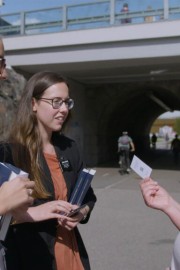The Mission
**Seen for the 2022 Sundance Film Festival.
There are certainly discussions to be had about the concept of missionary work and missions, and how they involve almost “pushing” one’s religion on others. There are also discussions to be had about the rigid conservatism of The Church of Jesus Christ of Latter Day Saints, and how they have- traditionally- discriminated against homosexuality. Neither of them are appropriate for this movie, however. What sets “The Mission” apart from something like, say, “Jesus Camp,” when it comes to religious documentaries is how honestly it focuses on individual journeys of faith in its main subjects. We’re certainly welcome to judge what they’re doing, but why they’re doing it is profoundly personal, and powerful to follow. In that way, “The Mission” feels more in line with “Into Great Silence,” which looked at life in a monastery with unparalleled access, and a deep desire to show the evolution of faith in the individual, in a situation that isolates them from the life.
I married into a family that is part of the Church of Latter Day Saints. I am not a member myself, but I have been to some services. In 2017, one of our nieces went on a mission in Las Vegas. Every week, they were permitted to email friends and family who wished to receive the emails about their experiences. It was profound to read their words about their experiences, and even when they didn’t say it, you could tell the collective experience of those 18 months had an effect of them. Outside of that, there was no contact with family outside of a call at Christmas; it was all about the Church, and fulfilling their mission. Watching “The Mission,” director Tania Anderson gives us an added look at the everyday life, and personal thoughts, of that experience, and it is a profound one.
Making a commitment to one’s faith is not done lightly. Doing so in a way that separates you from the only life you’ve ever known is something most of us will never have to decide. Anderson follows four LDS missionaries- two boys (Elders) and two girls (Sisters)- as they go to serve out their missions in Finland. We see them with their families prior to leaving for the training center, where they will stay prior to going to Finland, before going to Finland. There, they will be paired up with other Elders and Sisters in different cities, and go and preach their gospel, and see if there are some whom wish to be converted. Prior to leaving, one of the Elders has an ambitious idea of trying to increase the percentage of Finnish people whom identify as LDS considerably. As all four will learn, however, that will be a tall order.
Windows into the inner lives of those who have faith are some of the most fascinating things to witness, but I think it can only, largely, work in the documentary medium. Certainly filmmakers have brought profound dramatic films on the subject to life, but a lot of times, one can see where filmmakers are lead more by ideology than faith in narrative cinema. Being able to be honest, and objective, in how they approach their subjects is something more likely to come from documentaries than in narratives. What is so impactful about “The Mission” is that it does not shy away from the doubts and struggles of their subjects, whether it’s personal struggles with the strain of being away from family for so long, the inability to communicate with people in their native language, or other, more personal issues that are difficult to quantify. The perspective of Anderson’s film is always on the individuals, not the message. We do feel like the faith of these characters is genuine, and not something that has been forced upon them. The difference that makes in how we approach these individuals as viewers is powerful.
“The Mission” makes it easy to see just how difficult mission work is for these young adults, not just in the impact it has on them personally, but in how challenging it can be to find people to listen to the message you’re bringing them, even if it’s a message of love. Some will humor them briefly, some will reject them outright, and others will listen, but ultimately, not find it to be for them. The one moment of success we do seem to see, we hear the words of the person they are speaking to, and we get it. Other times, we get glimpses of how the missionaries think about some of the people they’re faced with. I think they will offer insights unlike anything we’ve seen before. It might be silly to people outside the faith, but it will be honest. Above anything else, we should expect that out of any documentary; out of one about religion, that will challenge us more than others.










